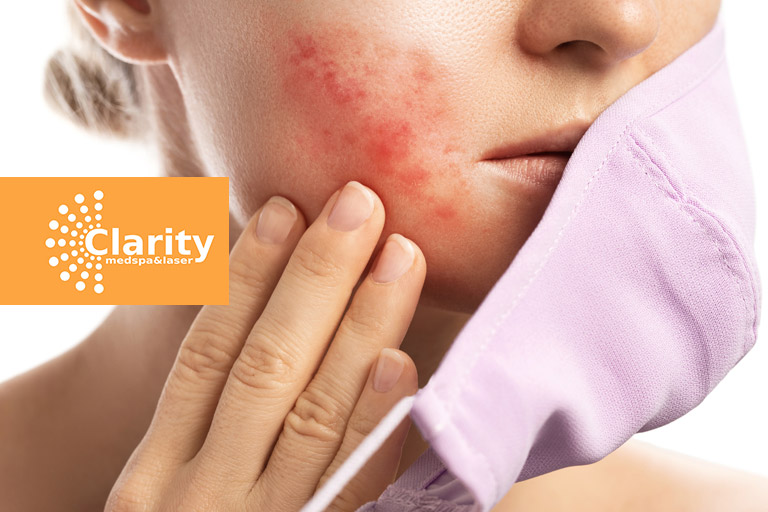What Is Maskne? How to Avoid and Get Rid of It
During the pandemic, health experts assert that wearing a mask can help reduce the spread of the virus, preventing respiratory droplets from spreading into the air and being inhaled by others. While masks are excellent for ending the spread of COVID-19 in the community, they also have one drawback — mask acne, or maskne.
Masks collect oil, germs, and dead skin that will then rub against the face, block pores and irritate follicles. For many, maskne is difficult to avoid, even if one wears a clean mask every day.
Masks are here to stay for a little longer. Here’s are some things you need to know to prevent maskne.
What Is Maskne?
Maskne is acne that develops around the lips, chin, and cheeks as a result of prolonged use of a mask. It is a form of acne mechanica, which occurs when the skin experiences friction or pressure due to rubbing, stretching or squeezing — much like the acne football players have when their helmet rubs against their skin.
The term “maskne” can either refer to the acne (clogged pores), rosacea (skin redness and pimples), contact dermatitis (a skin reaction to the mask itself), or folliculitis (infected hair follicles).
Is Maskne A Hormonal Acne?
Maskne can happen concurrently on a person with hormonal acne. Hormonal acne refers to acne that gets worse during particular times, like the menstrual cycle, as a result of hormonal fluctuations. Maskne can aggravate hormonal acne.
What Causes Maskne?
Wearing a mask or any form of face covering is the primary cause of maskne. Here are some factors that can exacerbate your condition:
- Dirt and Bacteria
Maskne is caused by clogged pores in most instances. Oil, germs, and dead skin cells are already present on your skin. When you apply a mask, though, these toxins can build up even more, clogging your pores. - Friction
Chafing, redness, flaking, and peeling skin can all be caused by friction. It can also trigger inflammation in certain cases. - Humidity
When we wear a mask, the humidity and moisture we exhale are trapped, changing the PH balance of our skin, causing irritation, aggravating existing acne, and causing new outbreaks by clogging pores. The skin might become dry, itchy, and raw as a result of heat and sweat. - Allergy
If a person is allergic to the substance used in particular masks, it might cause skin irritation or an allergic reaction. Washing the fabric masks with a scented detergent can also potentially cause skin irritation.
How to Treat Maskne
For the years ahead, masks are still likely to be a part of everyday life. Here are a few prevention and treatment tips on maskne:
- Use a clean mask every time
Here’s a gentle reminder — wearing worn masks increases our chances of outbreaks. Pore-clogging, acne-causing bacteria and dirt, such as sweat, grime, and oil, are easily trapped and collected by our face masks. So don’t worsen the situation by reusing disposable masks. Before leaving the house, put on a new, clean face mask. Also, don’t forget to swap out the filters on your reusable face masks.
If you are using a fabric mask, it’s crucial to clean it after each use . Washing your mask will get rid of all the oils and dead skin cells that contribute to maskne. Failing to do so can not only endanger your health, but it can also lead to your next huge pimple!
- Cleanse before and after wearing your mask
It’s a good idea to get into the habit of washing your face before and after wearing your mask, just as you would your hands. By not cleaning your face both before and after wearing your face mask, you’re making your skin an immediate breeding ground for breakout-causing germs. When bacteria accumulate on your skin for an extended period of time, you’re essentially signing a contract for your next major breakout.
Wash your face with a gentle, fragrance-free cleanser and avoid using hot water. Rather than rubbing the skin, a person can gently pat it dry with a clean towel. Individuals can use a light cleanser to eliminate dirt, bacteria, oil, and sweat from their skin, which can cause maskne. If you have sensitive skin, you should visit a skin care specialist or dermatologist to ask about the best products to use. - Moisturize
After cleansing, moisturizers should be applied to the skin to prevent dryness and irritation. Irritation and raw skin are common side effects of face masks.
To avoid breakouts, a person might choose a skin moisturizer that is made for their skin type. A gel moisturizer may be preferable for persons with oily skin or those who live in hot and humid climates. A lotion is appropriate for those with normal or mixed skin, while a cream is appropriate for those with dry skin.
- Use a clean towel to wipe off sweat
Since we do have to keep our face masks outside, it can only take a few seconds for us to perspire, which could then be trapped underneath for hours. Whenever possible, find a socially isolated and well-ventilated place and wipe your sweat off with a clean towel to keep your skin free of sweat. - Take a break from makeup
While you’re treating maskne, don’t wear any makeup. Cosmetics like foundation, concealer, and blush can clog your pores and slow down the healing process. Under a mask, avoid wearing make-up or rich moisturizers because they will block hair follicles and worsen acne. If at all possible, avoid using make-up and instead opt for mineral-based products. - Have a Breather
A study on the prevalence of mask-relate skin reactions comes to a recommendation of removing your mask for 15 minutes every 4 hours. This will assist in giving your skin a rest. Always remember to remove your face mask only when you’re able to maintain physical distancing from persons who aren’t members of your home. It’s also crucial to wash your hands before removing your mask.
Visit a Skincare Professional
Make no mistake, maskne is a real thing. Following these tips can help you deal with and prevent maskne. If you are concerned about this skin irritation, you should consult a medical professional immediately.
Looking for acne treatment in Toronto? Come to Clarity MedSpa. We only offer acne products and treatments that have been scientifically validated and proven to help acne-prone skin. Call 416 960-2222 to book an appointment today.



 Linkedin
Linkedin Facebook
Facebook  Instagram
Instagram  Twitter
Twitter  Youtube
Youtube